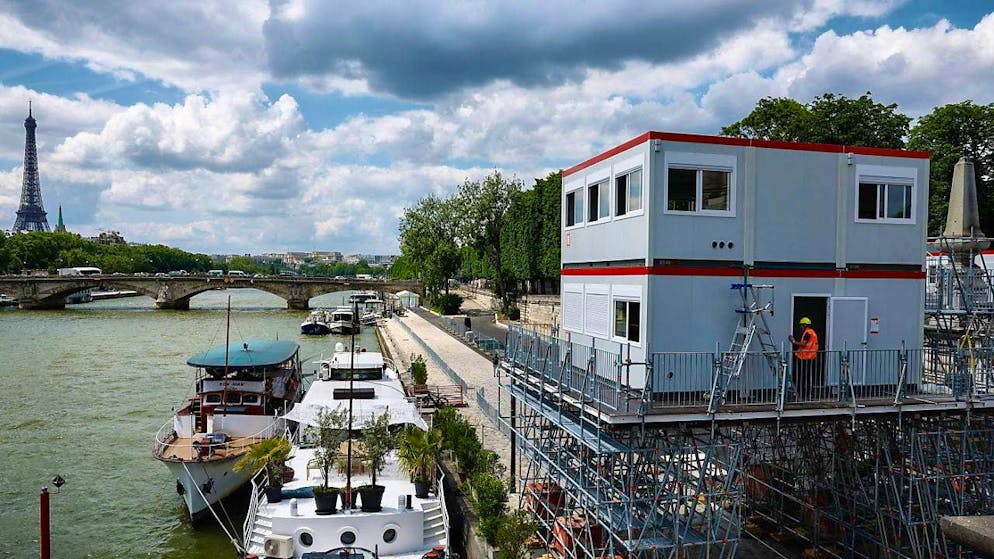
Paris 2024 should have been a return to normality for the Olympic movement. Now the political situation in the world - and in France - is anything but normal.
Two months before the opening of the Olympic Games, Place de la Concorde, the largest square in the center of Paris, was already in chaos. The stops of two metro stations were already closed, and pedestrians and drivers had to drive around them. "It's a pain that you can't even change from one line to another here," complains one woman.
The Olympics have dominated the city, which even in normal times receives more foreign visitors than any other in the world, for some time now. For better or for worse. Paris is ready, the competition venues are first-class, some of them even breathtaking - such as on the Place de la Concorde with temporary grandstands for 30,000 spectators or in front of the Eiffel Tower.
"I'm very confident," says Ralph Stöckli, the head of the Swiss Olympic delegation. "France has a lot of experience in organizing major events." For example, since its completion in 1998, the Stade de France has already hosted three Champions League finals, two Rugby World Cup finals, one World Cup final, one European Championship final and one World Athletics Championship. Organizationally, everything seems to be ready.
A mood of crisis instead of optimism
However, there is no doubt that Paris still faces huge challenges. While the last meeting of Baron de Coubertin's "Youth of the World" one hundred years ago was characterized by upswing and optimism after the First World War, depression now prevails.
At the beginning of 2022, there was still hope that normality would return two years later, with spectators attending the Summer Games for the first time since Rio 2016, without coronavirus restrictions. They will indeed be back, but the global political situation has taken a massive turn for the worse. Some problems are home-made, such as the usual accusations of corruption and nepotism (on a rather small scale) or the calling of elections just a few weeks before the opening, but for the most part France and the IOC are facing challenges that are largely beyond their control.
More than 45,000 security personnel
The biggest is guaranteeing security. 45,000 French police and security personnel are to ensure this, plus a few thousand from abroad. Since the Hamas attack on Israel last October and its counter-attacks, the terror alert in France has been at its highest level. The former colonial power has always been a popular target for terrorist attacks, and now it is even more so.
World politics is casting a shadow over the Olympic Games in other ways too, even if the IOC is still arguing - unconvincingly - that sport has nothing to do with it. Following the invasion of Ukraine, Russia and Belarus will only be represented by a skeleton team - and only with individual athletes under a neutral flag and after thorough examination.
But how can the organizers guarantee that there will be no attacks on Jewish athletes or visitors or protests against their participation? What happens if Muslim athletes refuse to compete against Israelis, as has happened in the past? How do we react when Ukrainians demonstrate against Russia or Russians wear a Z as a symbol of support for their army? How do we arm ourselves against the expected cyber attacks from Russia? These are all factors that could dampen the enjoyment of the games.
Spectacular images
However, there is also much to suggest that Stöckli will be right. Paris will deliver spectacular images, not least with the most ambitious opening ceremony in Olympic history. The athletes will sail down the Seine on 160 boats on a 6 km course. Instead of the privileged spectators in a stadium, hundreds of thousands of spectators will be able to watch the show, most of them free of charge.
The preliminary weather forecast for the evening of the opening on Friday, July 26, and for the days following is positive. It should remain fine, but extreme heat, as recently seen in Rio and Tokyo, is not expected. So a good week before the start of the Olympic Games, there is a slightly nervous mixture of fear and anticipation.
Some will be happy when things return to normal on the Place de la Concorde, others are proud of the major event at home, many will leave Paris at the height of summer anyway and some will perhaps appreciate in a few years' time that some of the infrastructure - such as the extension of metro line 14 to Orly airport - has been improved. Either way, tourists will remain loyal to the City of Love - with or without the Olympic Games.
SDA




